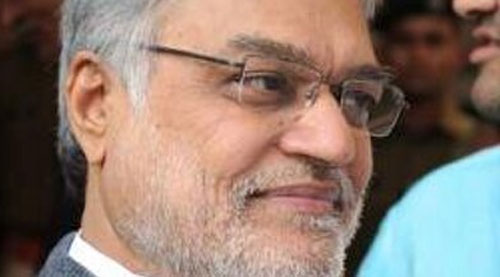Rajasthan Speaker C.P. Joshi on Wednesday challenged in the Supreme Court the high court decision to postpone till July 24 the disqualification proceedings against 19 rebel Congress MLAs, including Sachin Pilot.
Joshi argued that the judiciary cannot interfere with the powers that the anti-defection law gives him. The apex court is expected to hear the matter on Thursday.
Appearing for the Speaker, senior advocate Kapil Sibal requested Chief Justice of India S.A. Bobde to hold an urgent hearing, saying there had been a “travesty of justice”.
Justice Bobde asked him to place the request with the court registry.
“We need to mention it urgently, there needs to be a mechanism,” Sibal said.
“Ring up the registry and the registrar will list (the matter),” the Chief Justice said.
“This is a travesty of justice. There needs to be urgent hearing. The disqualification proceeding is stayed till July 24,” Sibal persisted.
Justice Bobde cut the discussion short, saying: “Don’t argue that case here.”
In the petition, filed through advocate Sunil Fernandes, Joshi has cited several apex court rulings, mainly a five-judge constitution bench judgment in Kihoto Hollohan v Zachillhu (1992).
That judgment said that under the anti-defection law, no court can interfere in proceedings before a Speaker until the Speaker has given a finding on the proposed disqualification.
Joshi has complained that on a petition from the rebel MLAs, Rajathan High Court decided to intervene at the initial notice stage itself, restraining him from even calling for replies till July 24.
His petition stresses that the 1992 judgment held that the courts cannot prohibit the Speaker from going ahead at the quia timet stage. Quia timet refers to an injunction against an imminent wrongful or illegal act.
Paragraph 110 of the 1992 judgment says: “Judicial review cannot be available at a stage prior to the making of a decision by the Speaker/ Chairman and a quia timet action would not be permissible. Nor would interference be permissible at an interlocutory stage of the proceedings.”
It adds that proceedings before the Speaker under the anti-defection law are proceedings of the legislature and that Article 212 read with paragraph 6(2) of the Tenth Schedule bars judicial intervention in legislative proceedings.
According to Joshi, the 1992 judgment makes it clear that any court interference into a Speaker’s order under the anti-defection law must be confined to jurisdictional errors, that is, infirmities based on violations of the constitutional mandate, mala fides, perversity or a failure to comply with the rules of natural justice.
His petition argues that the high court order is therefore illegal and perverse, and undermines the Speaker’s constitutional powers.
The Congress moved disqualification petitions against the rebels on July 14, alleging that they had by their actions given up membership of the party and should therefore be disqualified.
Joshi issued notices to the 19 MLAs the same day, seeking replies by July 17. The MLAs challenged the Speaker’s notice in the high court, which on July 21 restrained Joshi from further action until it had pronounced its verdict on July 24.











